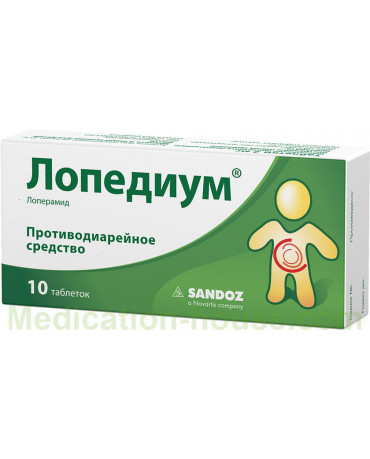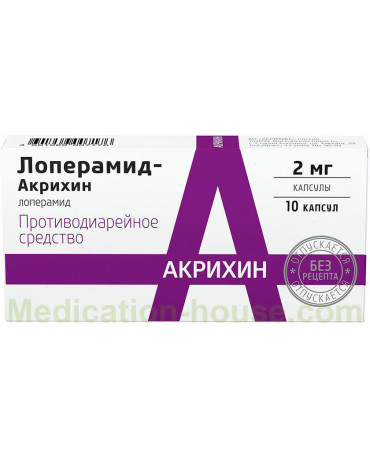Diara user manual
Reed more and buy Diara here
Diara is used to eliminate the symptoms of diarrhea of various etiologies. After taking the medication, the therapeutic effect lasts for six hours. Relief of the patient's condition occurs gradually.
During the first day, the frequency of urges to defecate decreases, on the second day there is a tendency to normalize the consistency of feces. To achieve the desired result, you must follow the course of application. Compliance with the regime will not only eliminate diarrhea, but also increase the level of non-specific immunity of the digestive system. Detailed information on this antidiarrheal agent is contained in the instructions compiled by the manufacturer.
The insert that can be found in each pack contains information such as indications, side effects, drug interactions, contraindications, as well as the form of release of the drug. This information should be carefully studied so that when taking no any unpleasant consequences.
Pharmachologic effect
The therapeutic effect of Diara's drug allows it to be used as an antidiarrheal agent for intestinal infections, food allergies, chronic diseases of the digestive system and functional digestive disorders. The medication normalizes some digestion and absorption of beneficial components in the body. Diara can be used in the absence of pathological processes, but there is a tendency to diarrhea (for example, as a result of eating certain foods).
Pharmacological properties
stopping too frequent urges to empty the intestines;
slowing intestinal motility;
increased tone of the anal sphincter;
lowering the tone of smooth muscles of the digestive organs;
normalization of the consistency of feces;
normalization of increased intestinal motility.
Indications
Diara is recommended for use in case of diarrhea, which is caused by a whole set of any reasons, for example:
An allergy that is accompanied by diarrhea;
Poisoning or the result of poor-quality food;
Infections or bacteria (if the bowel movements are lasting);
Improper nutrition, in which the leading place is occupied by smoked and fried foods;
Digestive system diseases, such as colitis, Crohn's disease, or gastritis;
Alcohol or chemical poisoning;
The result of prolonged use of any medication;
Climate change;
As a result of dieting;
Surgical intervention;
Diseases of the kidneys, liver, etc.
Method of admission
Diara tablets should be taken orally, while they must be chewed carefully. You do not need to drink the tablets right away, however, at least 2 liters of water or juice should be consumed per day. Capsules must be washed down with water.
The first dose should be taken 2 tablets or capsules. After each subsequent bowel movement, take 1 capsule or tablet. A maximum of eight tablets / capsules may be taken per day.
Tablets Diara can be given to a child from the age of six, while capsules can not be given up to twelve years. Tablets or capsules should be given in 1 piece. Reception must be divided into 3 times.
Diara should be discontinued immediately after stool normalization or the absence of loose stool for twelve hours. For children, this drug can be given no more than three days.
Release form
The drug is available in the form of capsules, as well as tablets.
Capsules have a dark green tint. Content is a powder of white or white-yellow color. The composition of this form includes loperamide hydrochloride, as well as corn starch, magnesium stearate and microcrystalline cellulose.
The tablets also have a white tint, as well as a slight smell of anise. The composition of the product includes loperamide hydrochloride, as well as potato starch, aerosil (colloidal silicon dioxide), menthol, anise oil, polymethylsiloxane, sucrose, collidone SR, lactose, microcrystalline cellulose, lactitol, povidone, magnesium stearate, aspartame, xylitol.
Side effects
During the treatment period, the patient may experience side effects that can be expressed in conditions or diseases such as:
Sleep disturbance, nausea, thirst, constipation;
Dizziness, pain in the head;
Bowel spasm, abdominal pain;
Lack of coordination, as well as any other manifestations of allergies;
Respiratory failure.
Treatment: First of all, you need to rinse the stomach, as well as conduct an antidote - naloxone. During the first two days should be in the hospital.
Overdose
The consequences of an overdose of the drug can manifest itself in serious deviations of some body systems. A single overdose can cause dizziness, a sharp headache or drowsiness. With a regular violation of the dosing regimen, the risk of impaired coordination of movements, convulsive conditions, stupor, intestinal obstruction and muscle weakness increases. In some cases, an overdose causes respiratory depression in the patient.
Other effects of overdose:
dry mouth
intestinal colic of varying intensity;
allergic manifestations;
depression of the central nervous system;
indomitable vomiting;
chronic constipation.
Contraindications
It is not recommended to prescribe a medicine in the presence of such conditions in a patient as:
Allergy to the individual components of the drug;
Bowel obstruction;
Diverticulosis;
Diarrhea, which appeared against the background of pseudomembrase enterocolitis;
Ulcerative colitis (acute form of medication);
Monotherapy of gastrointestinal infections.
In addition, caution, this drug can be prescribed for renal or hepatic insufficiency.
Pregnancy period
In the first trimester of pregnancy, when all vital organs are laid, as well as during breastfeeding, the use of this drug should be abandoned.
The fact is that the drug has an effect on the development and health of the baby. The active substance of the drug affects blood pressure, uterine tone, as well as many other body functions, its overabundance in the body leads to miscarriage, as well as improper development of the baby.
In the second, as well as the third trimester, it is allowed to take this drug, however, its dosage should be very limited. Reception can be made only in special cases. 3. special instructions
Influence on the ability to drive vehicles and control complex mechanisms
Diara does not have a negative effect on the nervous system and does not violate the natural psychomotor reactions.
Pregnancy and lactation
An absolute contraindication for taking the drug is the first trimester of pregnancy. At a later date, you should also refuse to take Diara, but the potential harm will be lower. The ability of an antidiarrheal agent to reduce the tone of smooth muscles of the internal organs can have a negative effect on the development of pregnancy.
Use in childhood
It is strictly forbidden to prescribe Diara to preschool children (the drug is approved for use from the age of seven).
With impaired liver function
The instructions for the drug contain information on the need for caution in the presence of liver failure. It is forbidden to take the medicine on your own with such a pathology.
In case of impaired renal function
Mandatory consultation with a specialist.
Shelf life
Diara's medicine must be protected from children and pets. The drug should be put in a place protected from light and water. The temperature in the room should not be higher than 25 degrees. In addition, the place should be dry.
If all conditions are met, Diara can be used for no more than two years. Acceptance of funds after the expiration date, which is usually indicated on the package, is not allowed. The drug must be disposed of.
Reviews
Reviews about the drug are mostly positive. This once again confirms that the drug is quite effective. In addition, patients really like the low price of the medicine, the convenient way to take it, as well as the possibility of taking the drug during pregnancy.
Negative reviews are associated with a large list of contraindications.
Terms of sell
You don't need a prescription to buy Diara.



